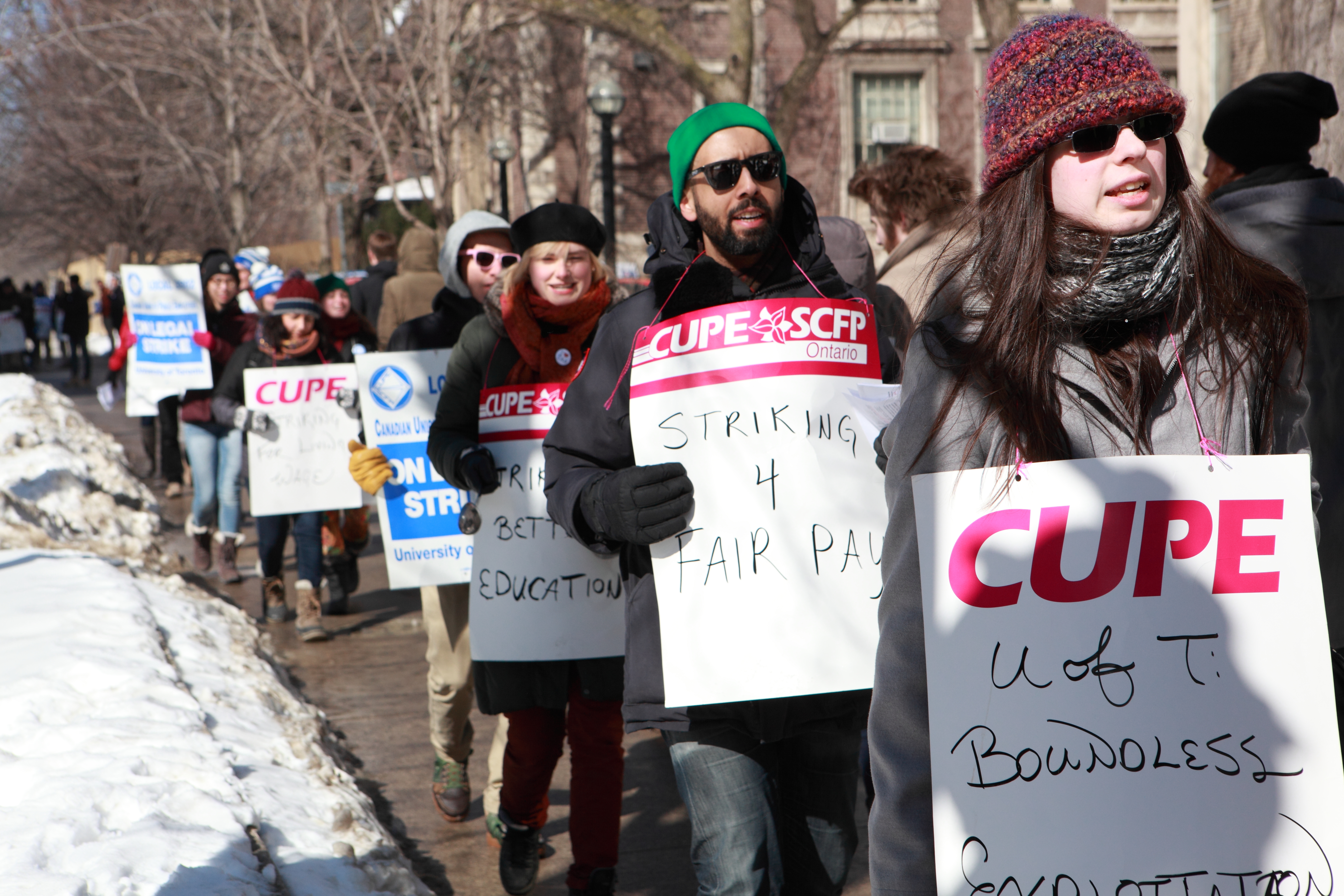Chip in to keep stories like these coming.
With over 9,000 graduate students on strike at both the University of Toronto and York, we need a special kind of roundup. Given that both the employers and workers in these labour disputes are paid to reason, educate and argue, you can imagine that there has been a lot of discourse in and around this strike.
At U of T, that has meant open letters, which lay out the issues and changes in the strike very clearly. Here, in epistolary form, is some context for understanding the strike at U of T:
-
We’ll begin with this: CUPE 3902 ask that in solidarity, supporters sign on to send this letter to the university’s administration — who refused to negotiate for the first two weeks of the strike.
-
Faculty at U of T also published this open letter in the Toronto Star, in support of the striking graduate students. More than 240 faculty, emeriti and librarians signed the letter.
-
Vice President and Provost Cheryl Regehr and Vice President of Human Resources and Equity Angela Hildyard penned this open letter to the “U of T Community,” which received this response from the CUPE 3902 chief negotiator.
-
Several PhD students from the Faculty of Social Work also wrote this letter in response to Regehr’s comments. In it, they ask that the Provost “stop talking about us and start talking to us.” As in: let’s get back to the bargaining table.
-
In a letter printed in The Varsity, U of T’s campus newspaper, two PhD students try to reason with undergraduates about the funding reasons behind the strike. They write: “Graduate school might seem like a great deal, because we don’t pay tuition and get $15,000 in funding. However, many grads including myself are paying tuition ($8,000-$20,000 a year) and nearly 60 per cent of that is earned through work as TAs, research assistants (RAs), and course instructors (CIs). Yes, we are paid $42/hour for this, but this is part of the $15,000, so wage increases mean nothing when the funding remains unchanged.”
-
And from the CUPE 3903 website, over 70 letters of endorsement from faculty groups, academic departments, and other labour groups. To sum up the general sentiment of those letters, here are some particularly choice lines from the Women and Gender Studies Institute’s letter of endorsement: “We share a common commitment to academic integrity and learning, as well as recognition of the sharp inequalities that have come to condition the different working roles at the University. We recognize the precarious labor conditions that teaching assistants, course instructors and sessional instructors work under, as well as the fact that working conditions are structurally tied to the quality of undergraduate education.”
-
Also included in that bunch of letters is the statement made by the University of Toronto Students’ Union, which represents more than 50,000 U of T students. In it, the students emphasize the connection between fair working conditions and a fruitful learning environment: “When the contracts of our TAs don’t include enough time for responding to emails, meeting with us, or marking our work, our education suffers. If our course instructors have to take on multiple low-paying jobs to pay their bills, it affects their ability to provide quality teaching.”
- Nearly 100 members of the MSW Class of 2016 at the Factor-Inwentash Faculty of Social Work signed and hand-delivered this letter to Vice President and Provost Cheryl Regehr a week before the strike began.
-
Finally, this incisive letter written by Associate English professor Paul Downes articulates some of the best reasons why faculty should support the strike: “Who represents our graduate students before the administration? Is it us? Is it our Chairs and graduate officers? The truth is that as the conditions and prospects for graduate students have deteriorated year after year, graduate students (especially in the humanities) have been forced to seek effective representation somewhere, and they have found it, for now, in CUPE. Anyone who wants to deny them that opportunity ought to think seriously about what they have to offer in its place.” He also points out that given the chronic underfunding in university humanities departments, “striking CUPE members […] are putting a great deal on the line, and they are doing so primarily for graduate students in the humanities — OUR graduate students!”
CUPE 3902 isn’t the only academic workers local going on in Toronto. York University teaching assistants are on strike too.
A solidarity rally for York University strikers, who are with CUPE 3903, is being held at Dundas Square in downtown Toronto on Satuday, March 21, 2015. For more information on that rally, click here.
Ella Bedard is rabble.ca’s labour intern and an associate editor at GUTS Canadian Feminist Magazine. She has written about labour issues for Dominion.ca and the Halifax Media Co-op and is the co-producer of the radio documentary The Amelie: Canadian Refugee Policy and the Story of the 1987 Boat People.
Chip in to keep stories like these coming.




